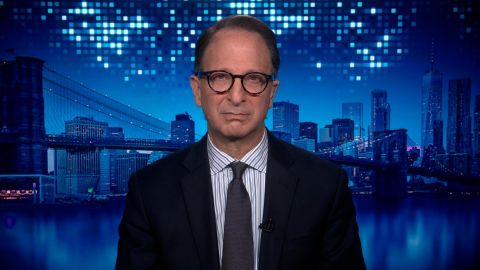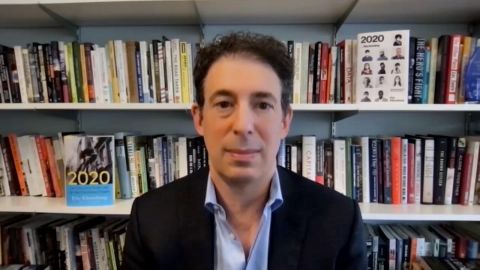Read Transcript EXPAND
ANDREW WEISSMANN, FORMER TOP PROSECUTOR: I’m not surprised by a defendant in a criminal case seeking to avoid his day in court. That happens all the time. Most defendants are not anxious to have a trial. So there, Donald Trump is doing something that is quite typical of defendants, although to be fair, it is very atypical to somebody facing this many criminal cases. I think what is surprising to me is that the final sort of check and balance in the United States, which is the judiciary, because we have three branches of government, we have Congress, we have the executive branch and we have courts, is that the courts I think heretofore have done a good job, but we’re seeing the erosion of the court system under constant attack. And so, the two main federal cases, the one in Florida for the retention of classified documents and the biggest one, January 6th so-called insurrection case in Washington, in D.C., those cases are very much on hold, and that is because of the actions of either Supreme Court of United States that has stayed the D.C. case or the judge in Florida who seems to be in no hurry at all to have a case go to trial. And so, that, I think, is a real issue in terms of how the United State deals with this problem that other countries have faced, which is how do you hold political leaders and former political leaders to account when they have engaged in alleged criminal conduct?
CHRISTIANE AMANPOUR, INTERNATIONAL HOST: I want to ask you, because you mentioned the judge in Florida who appears to be this — you know, through reading about her — what’s the right word — sympathetically disposed to President Trump. So, do think the Supreme Court, and in this case, the judge in Florida, is throwing out lifelines to him on issues that go beyond the letter of the law?
WEISSMANN: Well, there is a track record. So, I think you really don’t have to — with respect to the Florida judge, you don’t have to take it from me, a former prosecutor or a law professor. If you recall, in the pre-indictment phase, she oversaw the search warrant and litigation of around the search warrant of the former president’s home and beach club resort in Mar-a-Lago, and not once but twice she was reversed by the appellate court in very scathing language. And I think probably the most notable for your viewers is the Appellate Court saying that Donald Trump, because he is a former president, is not entitled to extra sympathy, to extra benefits. He should be treated no better and no worse than anyone else. And the courts that reversed the Florida judge are very conservative appellate judges. And that’s a good sign that — you know, regardless of sort of who appointed them, those judges were willing to follow the law. But it’s a bad sign in the sense of the district judge really does have this track record of really viewing the law through a partisan lens. And I’m really sorry to have to say that.
AMANPOUR: Yes. Well, it is worrying because, you know, nobody should be above the law obviously. But let’s just talk about January 6. I introduced you by speaking about President Trump — Former President Trump who constantly attends every single campaign appearance as far as we can tell, to the tunes of an insurrectionist prison song who have sung the national anthem. That he does, and he salutes. And he praises them. And what we have is “The New York Times” — sorry, the Supreme Court, who won’t hear the arguments until late April, meaning they may not even get a ruling until June. This is “The New York Times,” with each delay, the odds increase that voters will not get a chance to hear the evidence that Mr. Trump sought to subvert the last election before they decide whether to back him in the current one. So, that’s their view. What does, as a lawyer and a prosecutor, do you think voters miss out on, people miss out if this is delayed and delayed and delayed before the election?
WEISSMANN: Well, this, I think, Christiane, relates very much to the conversation that you were just having with Mr. Haass about the so-called election in Russia. And I’m not trying to equate the two. But the issue is that the purpose of a criminal case is it affords the defendant, but also everyone who is seeing that public trial, a forum where facts and law matter. And by the way, the outcome could be that he is acquitted, that the government does not prove the case beyond a reasonable doubt. But the outcomes could also be the facts in law are quite disadvantageous to Donald Trump in terms of his election, because it will show what he did on January 6th and leading up to January 6th. So, I think the fact that we are left without that forum, that — which is how things are supposed to be decided when there’s a dispute in this country, with all of the protections afforded to a defendant, that had — the case has to prove beyond a reasonable doubt, the highest standard that we have in the law and it has to be found by a jury of 12 people unanimously is — it’s not just a shame but it means that what the electorate is left with is untested adjectives and adverbs and a sort of court of public opinion but it is not actually subject to the rules of evidence and testing that you get in a court of law.
About This Episode EXPAND
Richard Haass on Putin’s re-election and how the U.S. might approach its bilateral relations with Israel at a time when over 31,000 people have died in Gaza. Andrew Weissmann on his new book “The Trump Indictments” and what lies ahead as the 2024 U.S. Presidential election approaches. In his new book “2020″ Eric Klinenberg examines the events of 2020 through the eyes of seven New Yorkers.
LEARN MORE

